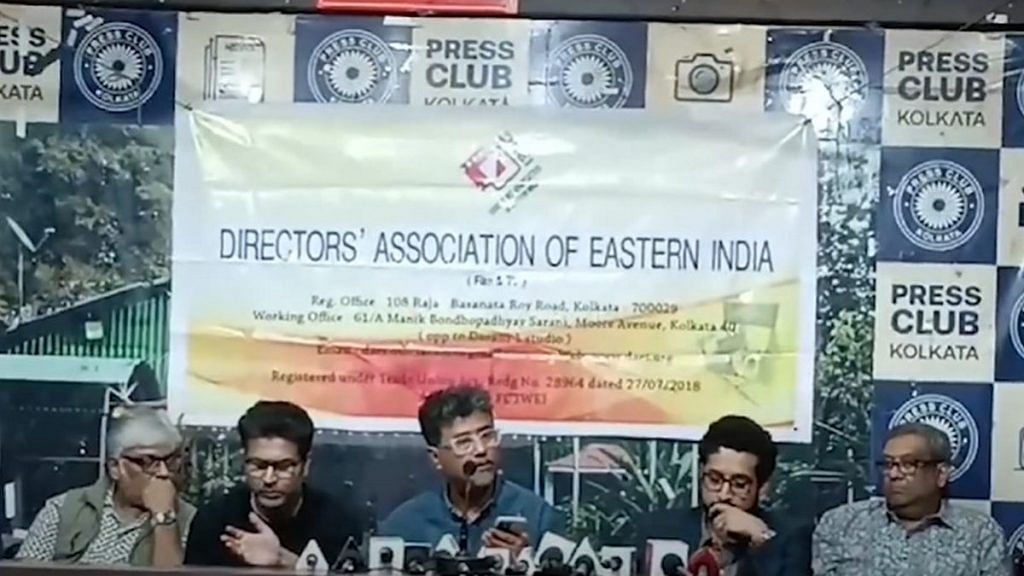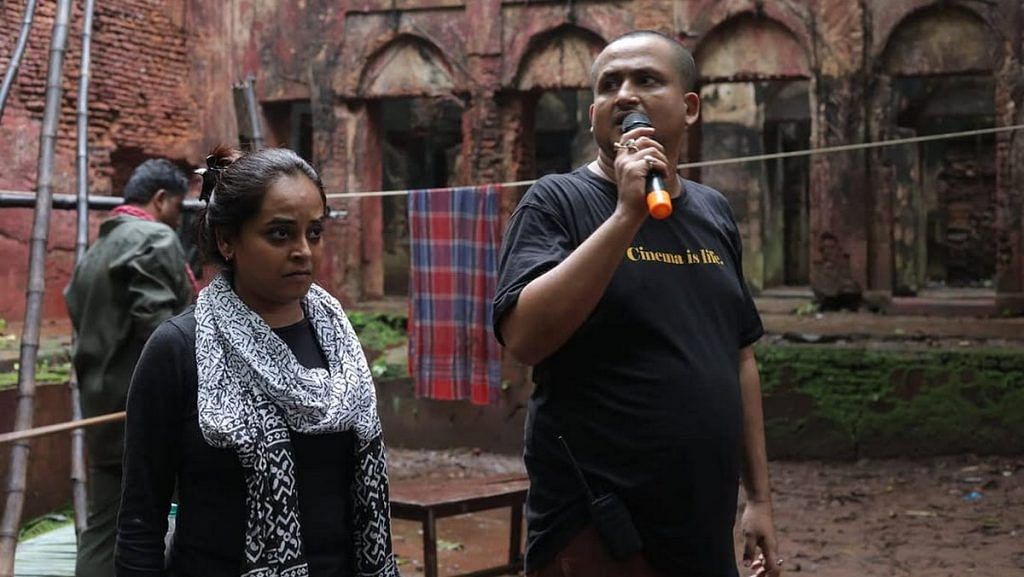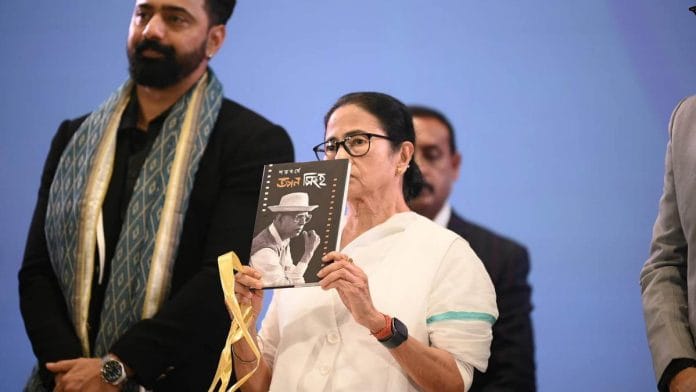Kolkata: Chief Minister Mamata Banerjee opened the Kolkata International Film Festival this week with lofty praise for Bengal’s late greats and an invitation for global filmmakers to shoot in the state. But behind the scenes, Bengal’s film industry is crumbling. The Tollywood trade union’s rules have paralysed productions, pushed up costs, packed off projects to other states, and provoked a bitter standoff with directors.
In 2023, 134 Bengali films were made; this year, that number has dropped to just 37, claim filmmakers. TV serial production has nearly halved—down to 23 from over 40 last year. Even as Mamata wooed international directors, Tollywood’s filmmakers were warning that Bengal has become one of the toughest places in India to make movies.
The industry that once gave the world Satyajit Ray, Ritwik Ghatak, and Mrinal Sen is in the throes of an existential crisis like never before. Bollywood’s pan-India juggernaut has eaten into its audience and the industry has long been going through a reputational slump. But now the Federation of Cine Technicians and Workers of Eastern India (FCTWEI)—a union representing 26 guilds, from actors and directors to technicians and floor assistants—is gnawing away at Tollywood’s very foundations, claim a section of Tollywood filmmakers.
They allege its rules are suffocating: crews are forced to hire unneeded guild members, foreign shoots are saddled with bloated costs, and non-guild workers are effectively shut out. The Federation’s tactics, to many, seem like a throwback to Bengal’s Left Front years, when unions crushed industries in the name of welfare.
Just a day before the festival, the Directors Association of Eastern India (DAEI) announced plans to file a case with the Competition Commission of India (CCI) against the FCTWEI. The the directors’ guild, notably, is also part of this larger federation.

The FCTWEI is headed by Swarup Biswas, the younger brother of state Power Minister Arup Biswas, a close aide of Chief Minister Mamata Banerjee. Since Mamata claimed the CM throne in West Bengal, the perception is that the Biswas brothers have tightened their grip on the state’s film industry. Several actors—from Dev Adhikari to Nusrat Jahan— have also joined the Trinamool Congress, with some even securing seats in Parliament and the state Assembly. Insiders claim that Swarup Biswas dominates decision-making in the industry, backed by the political clout of his elder brother.
“They are pushing unskilled labour in departments to generate employment but it cannot go on like this,” said actor Anirban Bhattacharya at a press conference on 3 December. “It is important to speak out now because the Bengali film industry is standing on the edge, if we cannot resolve these issues then the industry cannot be saved.”
Bhattacharya was joined by actors Parambrata Chatterjee and Sudeshna Roy, along with filmmakers Kaushik Ganguly, Indranil Roychowdhury, Subrata Sen, and Shiboprosad Mukherjee.
(Before 2011), we didn’t know who the Federation head was, unlike the present scenario. Politics and filmmaking are now inseparable and a decline is imminent.
-Anik Dutta, filmmaker
The damage is already evident, not just in films but OTT. During COVID-19, relatively lenient lockdowns made West Bengal a hub for OTT projects, but soaring costs have changed that. Zee5 Bangla, a major platform, has even shut down its operations in the state.
The DAEI’s move to petition the CCI takes the fight up a notch. As India’s watchdog for monopolistic practices, the CCI has issued orders against film unions before for anti-competitive tactics like obstructing work, boycotting directors, and stifling outside talent. However, the FCTWEI is accused of flouting these directives.
Speaking to ThePrint, FCTWEI president and TMC member Swarup Biswas said he was unaware of the directors’ decision to approach the CCI.
“We will analyse the situation before deciding on a course of action,” he said.
The FCTWEI’s rules have made filmmaking, especially foreign shoots, prohibitively expensive. Rather than engaging local talent when abroad, filmmakers are supposed to import a minimum number of technicians and other staff from Bengal.
Also Read: Bengali films facing identity crisis. Losing box office battle to Pathaans and RRRs
Guilded cage
For Tollywood filmmakers, the federation’s rules are Kafkaesque—arbitrary, punitive, and occasionally nightmarish. New rules appear out of nowhere, and getting into a guild—a must for steady work—is a frustrating process with no transparency.
“New rules are informed orally or via WhatsApp, or through production controllers to the directors and producers,” said actor and director Parambrata Chatterjee. “But the Federation is a trade union body and doesn’t have any provisions to make rules— it’s a welfare body.”
But breaking these rules come with heavy consequences. Guild members—stylists to light technicians—can boycott a production, derailing it entirely, as seen in the July standoff between technicians and filmmakers.

If a director or producer wants to bring a non-guild member into their unit, they can only do so after meeting the FCTWEI’s stipulated number of 19 guild members.
“If a person isn’t part of any guild, they will get work only after positions in the film production are filled by the members of the guild. Just because someone isn’t a member of a trade union, they will be denied a job—it’s against Article 21 of the Indian Constitution,” said Parambrata Chatterjee.
Joining a guild, however, isn’t easy either. Filmmakers claim the process depends entirely on the discretion of guild leaders, leaving many aspiring technicians in limbo for years. In September, a Kolkata hairstylist attempted suicide after she was reportedly denied work opportunities by an FCTWEI guild. She had allegedly been suspended from it for unclear reasons and then faced ‘harassment’ even afterwards.
“I was suspended for three months from May 1 but even then, I was not allowed to work properly… Committee members of my guild are responsible for this,” the woman had written in her note.
The incident caused outrage about the alleged weaponisation of guild membership, with actor Sudipta Chakraborty condemning the “threat culture” that dominates Tollywood.
Yet little has changed. Even graduates from government-run film institutes face hurdles, including being required to take an exam to join a guild.
“This doesn’t happen in any other industry except here,” added Chatterjee. “How can a trade union conduct examinations? This is bizarre.”
Low budget films are exempt from hiring 19 guild members but the film has to be shot under Rs 30 lakh—a ceiling fixed by the FCTEI. They are also barred from using high-tech cameras.
Financial squeeze
The FCTWEI’s rules have made filmmaking, especially foreign shoots, prohibitively expensive. Rather than engaging local talent when abroad, filmmakers are supposed to import a minimum number of technicians and other staff from Bengal.
Filmmaker Indranil Roychowdhury claimed that the body has made it mandatory for a unit of 19 guild members to shoot no more than two consecutive projects at a foreign location. For a third project in the same place, the filmmaker must hire a fresh set of 19 guild members.
“We have to pay for their tickets, visa, stay, food, and salaries even if we don’t require so many persons on set. This increases the production cost,” said Roychowdhury, adding that foreign shoots have nearly stopped as a result.
Earlier, a day’s shoot would cost approximately Rs 1.5 lakh, which has now skyrocketed to a minimum of Rs 5 lakh. The neighbouring states of Jharkhand and Odisha are now a better option to shoot than Bengal due to these policies.
-Kaushik Ganguly, filmmaker
Low budget films are exempt from hiring 19 guild members but the film has to be shot under Rs 30 lakh—a ceiling fixed by the FCTEI. They are also barred from using high-tech cameras.
OTT productions are also feeling the squeeze. Roychowdhury pointed out that the Federation’s 14-hour daily cap for shoots makes filming OTT series financially unfeasible.
“Serials are shot through the year, but OTTs are usually shot in less than a month’s time for web release. With the 14-hour time limit, you increase the shoot period and then the viability of the project is lost.”
Another financially unsustainable rule is the call-time policy, according to filmmakers. No matter where a shoot is located, the clock starts ticking when technicians leave their studio in Tollygunge (from where Tollywood gets its name). So, if travel to a location takes three hours, producers pay for that non-working commute time.
The federation is “bleeding” the film industry in Bengal, said filmmaker Kaushik Ganguly, whose latest film Ajogyo performed well at the box office this year.
“Earlier, a day’s shoot would cost approximately Rs 1.5 lakh, which has now skyrocketed to a minimum of Rs 5 lakh,” he said. “The neighbouring states of Jharkhand and Odisha are now a better option to shoot than Bengal due to these policies.”
Also Read: Mrinal Sen returns to screen but Bengal box office is waiting for Allu Arjun’s Pushpa 2
Deadlock continues?
Tensions in Tollywood reached a boiling point in July when filmmaker Rahool Mukherjee was slapped with a three-month ban by the FCTWEI. His ‘crime’: shooting parts of his series Lahu in Bangladesh with technicians from there rather than hiring workers from Bengal.
The fallout was swift and dramatic. Technicians walked off the set, forcing the production house SVF to remove Mukherjee as director and demoting him to creative producer. Mukherjee’s film Production Number 171, starring Prosenjit Chatterjee, Anirban Bhattacharya, and Priyanka Sarkar, also ground to a halt. Most film and television productions across Tollywood studios came to a standstill for days as Bengali directors staged a boycott against the FCTWEI’s “whimsical” diktats.
Weeks of stalemate followed, until Chief Minister Mamata Banerjee stepped in to defuse tensions. She met with filmmakers and technicians at the state secretariat and announced the formation of a committee to draft new SOPs for the industry. This committee included veteran filmmaker Gautam Ghosh, actor Prosenjit Chatterjee, TMC MP and actor Dev, and TMC ministers Indranil Sen and Aroop Biswas. But since a review meeting in August, the needle hasn’t moved and tempers are only rising.
The filmmakers were hoping our crisis will be resolved. But the committee members informed us that it hasn’t done much because it hasn’t even been notified yet.
-Sudeshna Roy, secretary of the directors’ guild
Sudeshna Roy, the secretary of the directors’ guild told ThePrint, despite writing three times to this committee to step in, there has been no development.
“The filmmakers were hoping our crisis will be resolved. But the committee members informed us that it hasn’t done much because it hasn’t even been notified yet,” she said.
The growing cracks in the industry were on full display at this year’s France-themed Kolkata International Film Festival on 4 December. Many prominent filmmakers and actors who spoke out against the Federation were conspicuously absent, though they haven’t formally cut ties with the event.
In 2022, the festival was dazzling, with the likes of Amitabh Bachchan, Jaya Bachchan, Shah Rukh Khan, Rani Mukerji, Arijit Singh, and Kumar Sanu attending it. But this year, it seemed more muted. The opening ceremony moved to the new Dhono Dhanne auditorium, with TMC MP Shatrughan Sinha and cricketer Sourav Ganguly as chief guests. The absence of big names from Bengal’s film industry was glaring, and tele stars and younger actors filled the stage instead.
“I want you all to bring your cinema, your artists here and let people from here work in your productions,” Mamata called out to foreign filmmakers at the event. Ironically, several international guests had visa troubles and couldn’t make it.
Filmmaker Anik Dutta, whose films Bhobishyoter Bhoot (2019) and Aparajito reportedly faced political hurdles during their release, rued the changes in the industry.
Before 2011, the Federation’s leadership would keep a low profile, he told ThePrint.
“In those days, we didn’t know who the Federation head was, unlike the present scenario,” he said. “Politics and filmmaking are now inseparable and a decline is imminent.”
(Edited by Asavari Singh)







Parambrata Chatterjee is protesting against guilds and trade unions? Wow!
Most of the names mentioned in this article are of those who have actively supported the Left, and subsequently the TMC, in their attempt to control and dictate terms to production houses. Producers are looked upon as capitalist vultures who are to be intimidated, humiliated and robbed in broad daylight.
And now they are reaping what they helped sow. What is the point of crying now?
The damage has been done. The work culture of the Bengal film industry has been destroyed. The work ethic of the cine workers in Bengal are, quite possibly, the worst in the entire world. Nothing much can be done now. The damage seems irreversible.